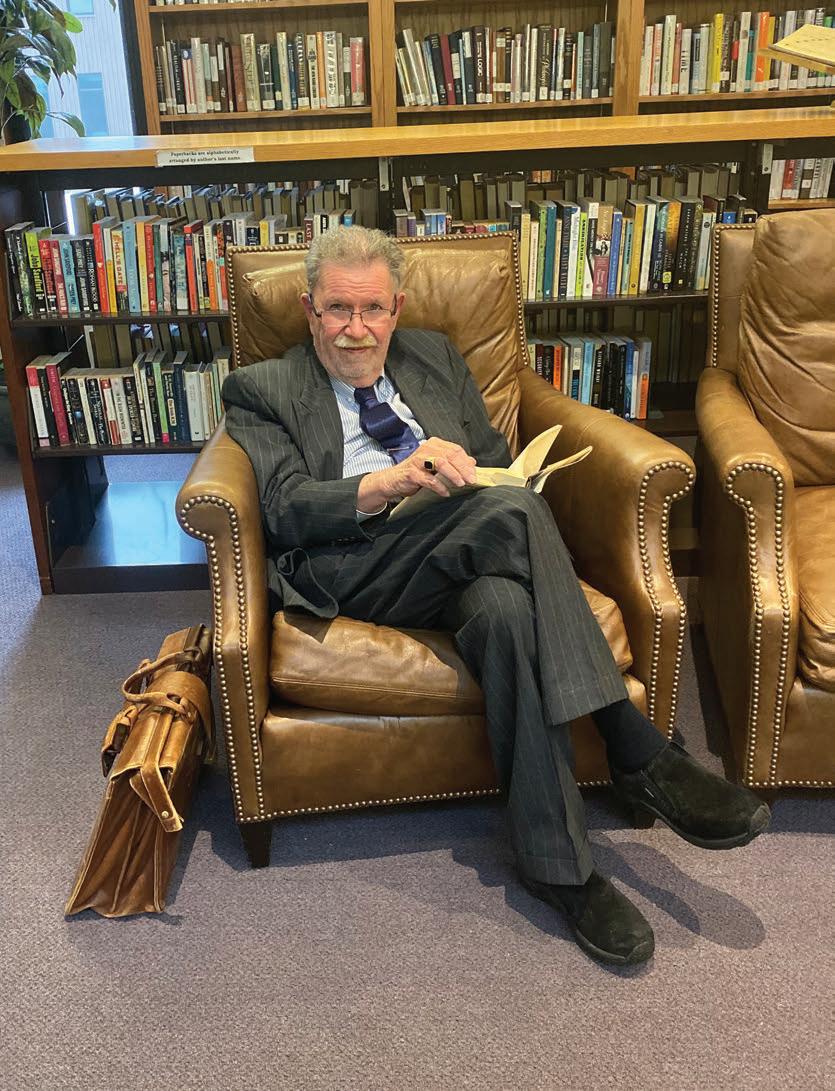
18 minute read
J. Clifford Hobbins, A Legend in His Own Time
A Legend in His Own Time
WITH HIS TELLTALE WIT, CHARISMA AND REVELATORY LECTURES, IT IS NOT AN UNDERSTATEMENT TO SAY J. CLIFFORD “BUCKS” HOBBINS CAPTIVATED FOUR GENERATIONS OF PORTSMOUTH ABBEY STUDENTS. SOME ALUMNI CLAIM THEIR LIVES AND CAREER CHOICES WERE FOREVER ALTERED AFTER TAKING HIS HISTORY AND HUMANITIES COURSES. OTHERS SAY HE INSTILLED IN THEM AN ENDURING LOVE OF LEARNING.
As Cliff begins his retirement this year after serving the School for 44 years, we reflect on the life and legacy of a man who held numerous official and unofficial posts: night watchman; house parent with an open-door policy; patient listener; animated and deeply knowledgeable teacher; and a caring friend and treasured mentor who upheld the values of the Benedictine tradition.
Former Headmaster Dr. Jim DeVecchi asserts Cliff was “born to teach” at the Abbey. “Over Cliff’s 44 years, our School enjoyed remarkable evolution and change; however, to the benefit of many, Cliff was constant and remained very much unchanged. Cliff essentially remained Cliff, plain and simple. To the many St. Benet’s boys, the image of Cliff: door open to his ground-floor Benet’s apartment, sitting in his easy chair, reading (What a reader Cliff is!), surrounded by his dogs, and enjoying his pipe, is indelible in their minds.”
Christopher J. Sullivan ’79 attests, “His relentless curiosity of how individuals can shape history was infectious to me as a young Abbey student and made me look behind historical events as to not only when they took place, but why and who created them.”
Little did Cliff know that he himself was making history at the Abbey each and every day. But long before Cliff held court at the School, he was enjoying his own formative years with an upbringing steeped in politics, giving credence to Dr. DeVecchi’s remark. Cliff really was born to teach at the Abbey.
EARLY LIFE LESSONS
Cliff grew up in Washington, D.C., where his childhood was infused with political discourse. Both his parents were in civil service– his father served in the Department of Justice and his mother served as secretary to the army chief of public affairs at the Pentagon. Cliff’s uncle, who lived with the family, worked at the Department of Veterans Affairs.
When Cliff was eight years old, he remembers excitedly heading downstairs on Christmas morning only to find a stack of Signature books on U.S. history, rather than toys. Any second grader would have been disappointed, but Cliff scoured the texts, which sparked a fascination with history that has lasted to this day.
Voracious readers all, the Hobbins family peppered the nightly dinner table with fervent political discussion. “The house was full of international relations and events of the day. It came with the territory,” Cliff recalls. “Harry Truman wanted mother as one of his secretaries in the White House, but she was too nervous. I was very put out with her for declining!”
Cliff’s own first contact with a major politician came in 1960, right after John Fitzgerald Kennedy won the Democratic presidential nomination. Cliff was visiting the Capitol Building. “I had a Kennedy button on; Kennedy was walking down a corridor, just the two of us, no one else around. He had on a PT-109 tie clasp, handed it to me and said, ‘Here, add this to your collection.’”
When Cliff was 11 years old, his father was transferred to Portland, ME. There, Cliff attended the Catholic Cheverus High School, where he developed a great admiration for his Jesuit teachers. He credits the Jesuits for some of the most important lessons he has learned in life. “When I was a sophomore in high school – this might surprise you, I know, it’s shocking – I had a smart mouth. One day a Jesuit grabbed me and said, ‘Remember one thing, Hobbins. You revolve
around the world; the world does not revolve around you.’ I’ve never forgotten that. It’s probably helped me more than anything else. That came as a shock.”
Following Cheverus, Cliff attended Marquette University, where he was inspired to take up the teaching profession thanks to several esteemed professors in history, most notably, professors Father Francis Paul Prucha and Dr. Frank L. Klement. Becoming a teacher rather than a lawyer was at first much to his father’s dismay, but Cliff stuck to his calling.
A SHIFT IN PERSPECTIVE
After earning his master’s degree at Marquette, Cliff began his first teaching job at Fryeburg Academy in Maine. He began in the summer school and rolled right into the fall semester there until October of 1969, when he was drafted into the army “spending time in Southeast Asia for my favorite uncle, Uncle Sam.” For 13 months Cliff served in Viet Nam as a member of the 101st Airborne Division, the “Screaming Eagles,” an airmobile division of the U.S. Army specializing in air assault operations.
Cliff returned to Fryeburg for a time before moving on to Gould Academy, where he taught English and history, ultimately named dean and history department head. Cliff also met his future wife, Nancy, while in Maine. First friends, they reunited years later in Newport, RI, and the rest is history.
Ever enthused about politics, Cliff lent a hand to several Maine legislature campaigns. Over the summer of 1976, he worked for Sen. Edmund Muskie’s (D-Maine) presidential campaign, running the Lewiston, ME, office and serving as the de facto chauffeur for Mrs. Muskie.
Since then, Cliff jokes that he’s taken a right turn politically. “Anyone who knows me knows that I have had a ‘certain transformation’ of my politics to the right, but at that time, it was very special to me,” he recalls.
Cliff’s political affinities shifted as he followed the economic and foreign policies of several U.S. presidents– and he didn’t like what he saw. In the late 70s and early 80s, Cliff turned to several definitive economics books: George Gilder’s Wealth & Poverty and William Simon’s A Time for Truth. From the 1980s on, his basic conservativism was cemented. In the classroom, he taught Milton Friedman’s Free to Choose and Robert Heilbroner’s The Worldly Philosophers, which is, in Cliff’s opinion, the greatest introductory book about commerce. Other favorites included Buchholz’s New Ideas from Dead Economists and Thomas Friedman’s The Lexus and the Olive Tree. His favorite book of all, he says, is “a little book that’s now out of print, Myles Connolly’s 1928 novel Mr. Blue. It shows the whole tragedy of the modern world in about 150 pages.”
Not generally interested in television, Cliff made an exception for a favorite pundit who appeared on Fox News. “One of my heroes – I think he was one of the smartest men in America – was Charles Krauthammer. Whenever I could find Krauthammer, I was fixated for a half hour.” In 1987, Krauthammer won the Pulitzer Prize for his column in The Washington Post.
Nancy Hobbins notes, “Cliff grew up in a very strongly Catholic, Democrat environment. His early childhood in D.C. during WWII certainly left its stamp. While his father and uncle were deployed in the war, his mother and aunt lived together with his grandparents very nearby. His mother worked at the Pentagon while his aunt ran the household. In general, that kind of commitment just doesn’t exist anymore. I suppose that’s why he looks so conservative now.... and why the Abbey felt like home.”
A PROFOUND IMPACT ON STUDENTS
Since arriving on Cory’s Lane in 1976, Cliff has taken part in every aspect of the School’s life. In addition to teaching, he served as assistant housemaster in St. Aelred’s House from 1976 to 1985 and housemaster in St. Benet’s House from 1986 to 1996. He has taught history, economics and political science, as well as summer school classes in English and history. He has driven our Ravens
Cliff with students from his Ecnomics class on a field trip to the NY Stock Exchange, 1987

to their co-curricular activities, led midnight security checks throughout campus, and hosted full-dress Santa Claus festivities for dozens of Abbey Christmas assemblies.
In 1977, Cliff’s second year teaching at the Abbey, eight Sixth-Form students approached him with the idea of teaching economics on the side. “I said, ‘How about Tuesday nights?’ They never skipped a night,” Cliff declares. “There were no books, they never took a test and they never got any credit – but they learned it all.”
Later that year, Cliff asked John Phelan ’80, whose father was vice president at Chase Manhattan Bank, if he could set up a visit for the students. Cliff and his students traveled to the New York Stock Exchange (NYSE), had lunch in the executive dining room with Theodore Roosevelt’s sons, as well as Harry Hagerty ’47 and Tom Healey ’60, then at Dean Witter Reynolds. To top off the experience Murray Teitelbaum, director of education at the NYSE, invited the group to watch the Stock Exchange from the Member’s Gallery. The trip became a yearly event for his economics students. “The most extraordinary people would come and talk to the kids; they all went out of their way every year,” Cliff recalls, who also expressed gratitude to James Phelan P ’80 ’82 ’87, Peter Flanigan ’41 and NYSE Chairman David Shields ’57.
By the late 90s, Cliff found that his economic class had become mostly theoretical. “I was teaching about recession, depression and terrorism, and there was no recession, depression or political shenanigans,” he says.
But suddenly, his class realigned with reality. “A week after I talked about the stock exchange, bam! Four trillion dollars was wiped out,” Cliff recalls. “A week after I taught about the electoral college, we had the election of 2000. And then I started teaching about foreign affairs, and in a jocular way, I said, ‘Now I realize you all need Old Testament demonstrations, but foreign policy is very different – it can be dangerous. People can get killed. Pay attention so that I don’t need to give you any demonstrations.’ And, bam! 9/11 occurred.” That afternoon, Cliff received a note in his mailbox from a student that read, “Why do your predictions come true?” From then on, his students seemed to double down on their concentration because reality was nipping at their heels.
Cliff’s spellbinding lectures were renowned, as was his ability to engage students one-on-one. Many students viewed Cliff’s signature course—History 8 (Economics/ PoliSci/International Relations)—as a rite of passage, planning their Sixth Form year around the course. With 16 spots available, the class invariably swelled to more students thanks to Cliff’s philosophy: “The more, the merrier!” “My teaching style remained unchanged over the years,” he says. “I’m not a follower of John Dewey and progressive education. I’ve always used the traditional method of teaching, but I’m very pragmatic. Anyone I’ve hired, I’ve told, ‘Do whatever works.’ I follow Deng Xiaoping’s adage: ‘I don’t care if the cat is white or black as long as it catches mice.’”
His approach in the classroom and beyond had a farranging impact on his students, many of whom credit him for igniting their passions and career paths. Writer, professor and investor Michael Mauboussin ’82, chief U.S. investment strategist for Credit Suisse First Boston, sent Cliff a signed copy of his first book on investment strategy, giving him credit and thanks for “turning me on to economics.”
In January 2012, the J. Clifford Hobbins Chair in History was established to honor the passion for history and American political and civic engagement embraced by Cliff, as well as his impact on generations of Portsmouth students.
Dr. DeVecchi calls Cliff a “legend in his own time,” and he recalls a meeting with a very successful alumnus and Cliff on one occasion. “With much admiration and gratitude, this gentleman said that much of his success was due to the fact that he carried Cliff around with him like a little birdie on his shoulder. Cliff proved to be quite enduring.”
REFLECTING BACK ON 44 YEARS
Looking back over his years on Cory’s Lane, Cliff says the most fundamental change he’s witnessed has been the physical transformation of the campus.
“The Abbey was in tough shape when I came here,” he says. “Where the school building is now, there was an old Quonset hut that no one used. The Student Center was one
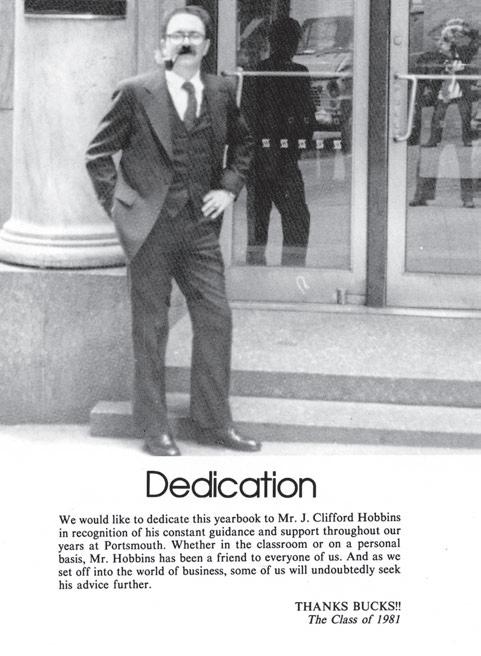
classroom building that’s gone through enormous renovation. We used to teach in there, with very thin walls, and in one of the rooms, there was a little tree growing up. There was no art center, there was no squash center, no lower gym – nothing. No St. Mary’s, no St. Brigid’s, no St. Martin’s.”
When Cliff made his rounds on the midnight security walk between St. Brigid’s and St. Mary’s, he would gaze at the campus and think, “It looks like New York City’s West Side! The facilities do make the key difference.”
Cliff also recalls the monumental change that happened in 1991 when the school embraced coeducation. “There were two ways to go: to say that the Portsmouth Abbey would continue to be a boys’ school but with girls, or to have a real coeducation,” he says. “The beauty was that the headmaster was a very hard-working fellow from England who didn’t quite catch American culture or American education, and so he left it alone, and coeducation grew naturally here. No one tinkered with it. And within a year, it was as if the school had always had girls. It’s like when Fr. Peter would build a building, once the building was finished, it was as if it was always there. And the girls who came here were just fantastic, and have been. They’ve added a great, great deal.”
One of Cliff’s own personal points of pride is how a Portsmouth Abbey education leads students to a life of public service. “Sometimes students go straight into such a life, and it’s not a surprise at all,” he once remarked. “Other times, it gets them interested, and they have ‘leader’ written all over them. I love to go to our Washington, D.C., reception; it’s like being back home again– to see Kate Snow, Sean Spicer, Kevin
Top right: Cliff with Charlie Day ’94 on campus;
Middle right: Cliff meets up with former students at Reunion Bottom right: Cliff addresses the Portsmouth Abbey community at the Martin Luther King, Jr. Day assembly
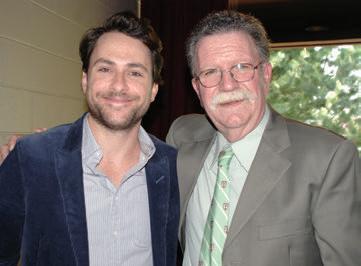
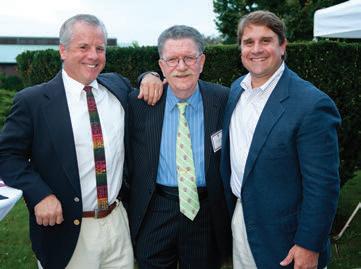
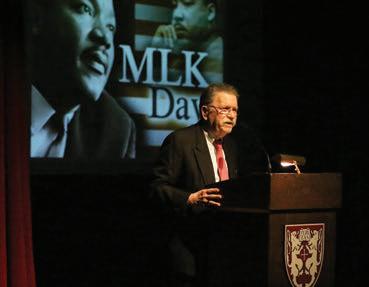
Mr. Hobbins was my favorite. The number of colorful stories are too many to relate – but the one that stands out most in my mind was when he recreated an Indian raid on Canada during the French & Indian Wars by crawling on his belly (dressed snappily in his customary three-piece suit) across the floor of the classroom with a pen/dagger in his mouth. He then jumped up and proceeded to scalp the entire classroom. Classic. Made a huge impression on me, and history is still my favorite subject. – Christopher A. Abbate’88 (Summer 2007 Alumni Bulletin)
Your passion for history, politics and debate was an inspiration to all of us who were lucky enough to have had you as a teacher. Thank you for your dedication and commitment to your students and to the Abbey. – Former U.S. Senator Peter Fitzgerald ’78
I still think of your Economics, Political Science, and Foreign Relations class and how much of an impact you had on my academic journey and life. I pursued a Political Science degree at Bowdoin, and I am now pursuing my MBA at Duke, in part because of you and the foundation I received in your class. I’ve kept my notes from your class all these years. I revisit them from time to time, looking for pearls of wisdom and inspiration. ‘Plan your work, work your plan’ and ‘Luck rewards the prepared mind.’ I cherish these, and all of your lessons. – Pierce King ’08
I had the honor of being both a student of Mr. Hobbins and a resident at St. Benet’s when he was housemaster. His class lectures were outstanding, and even more remarkable were the conversations we would have in the hallways of the dorm and around campus. With his door open, several dogs roaming around his residence, and jazz music on, he would always have a funny and smart thing to say. With my parents living in Venezuela, having someone like Mr. Hobbins present and reinforcing daily the values of our faith and my family made me feel at home and kept me out of trouble (most of the time). I learned a great deal about leadership and responsibility, which helped me quite a bit later in life. – Alejandro Perez Duque ’94
Cliff Hobbins’s notion that the stirrup was a critical innovation in the path from the Dark Ages to Medieval times and ultimately modern history was very insightful and has stuck with me for 40 years. Whether or not it was his original idea, I don’t know. But it demonstrates how well conceived lessons can stay with a student for a lifetime. – Patrick Ward ’81
I have few regrets as an alumnus of Portsmouth (’65). One however is that I was too early to enjoy the good teaching and caring mentorship of the famous Mr. Hobbins! However, Cliff McMillan. It’s neat to be in the same room with these people. I feel a real sense of pride in them.”

When asked how he nurtured a community environment within the House, Cliff happily relates, “It was a three-ring circus, and I was the ringmaster! I always respected the students, gave them a good deal of room, making sure each was confident in knowing that he could always come for help. My door was always open. We had a lot of laughs, and a lot of good conversation.”
A student’s experience in the House, he continued, “better prepares him or her for life after Portsmouth Abbey School. It gives him or her the sense of independence and responsibility that they will all need in their future.” And when reflecting on his most memorable moments, Cliff quips, “Let’s just say that living in a House is like going into a fun house – you know the gorilla will appear, you just don’t know when!”
Nancy Hobbins asked Cliff which three things about living and working at the Abbey made the greatest impact on him, he responded that he loved teaching students who wanted to learn. To this day he takes great pride in his former students and their achievements in the world. Secondly, he made
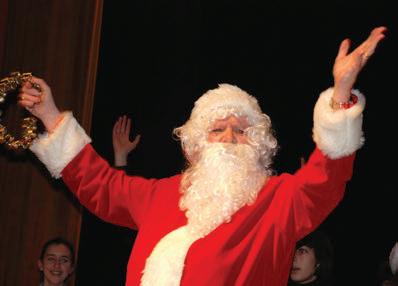
GREAT enduring friendships with faculty and monks, and last but not least, he lived the Catholic life.
Ambrose Fisher ’86 sums up the experience of many Abbey students, saying, “I was lucky enough to get four years with Mr. Hobbins. He introduced himself on my first day at St. Aelred’s (the then boys’ Third Form dorm) and was there on my last days at St. Benet’s. Bucks was a positive force for good at the Abbey. We all look back fondly and smile when we remember those days with him. Bucks was always there for us, whether it was as our teacher, dorm parent, advisor or mentor. He was good at each of these roles, too – always encouraging and supportive, but disciplined in his approach and guidance. He helped shape us in our formative years, and we will always be grateful.”
Fisher echoes many alumni sentiments when he concludes of Cliff: “You are one of the greats. Enjoy your well-deserved retirement.”
That goes for all of us here at Portsmouth Abbey!
– Kathy Heydt
was instrumental to our son Ambrose (’86), possibly even pivotal to getting him through to graduation! The adjustment to Portsmouth from the free-wheeling life of private school in California was no easy transition. Cliff added the extra care and rapport of his rifle +shotgun club to his personal touch in teaching the lessons of history in class. Cliff Hobbins, for our family, is remembered in the Pantheon of the greatest housemasters and teachers and friends at Portsmouth. We cannot thank him enough for what he has done for our family. – John A. Fisher ’65
My grandchildren Fenton’15, John’17, Lucia’18 and Teresa Billings ’20, knew Mr. Hobbins as a very special teacher. Each Parents’ Day I would see this teacher in action in the abbreviated classroom sessions. At every turn, the students – all of them – would sit there enthralled with this man and how he taught them valuable lessons. For me every visit was the same: great knowledge being communicated, wry humor at work, and proud students in the room. He will be missed! – John Fenton
Mr. Hobbins instilled in me a love of history, the progress of civilization and the triumph of the human spirit. His lectures, spontaneous travels down paths of political successes and tragedies at the same time always kept me focused on the curriculum like few other professors I have studied with in college or law school. What comes to mind are the trips he organized for students (senator/astronaut John Glenn @ the Newport Naval War College or to Wall Street to the NY Stock Exchange). My son Christopher ’14 and my daughter Molly ’15 also were lucky to have him as an instructor. – Christopher J. Sullivan ’79)
Not a day goes by that I don’t think back to or use a lesson you taught. I have also tried to recreate your educational-mentorship approach for my soldiers, cadets, students, and kids. Best of luck to you in your future endeavors and thank you for what you’ve dedicated your life to, not only your decades of students who sat in your classroom, but the soldiers you served with and led with when your Nation called! – LTC Sean Coulter’ 93
Many congratulations to Mr. Hobbins! He is a gifted, charismatic teacher; and his mannerisms and turns of phrase are still very vivid in my memory. – Brendan O’Higgins '93 I will never forget your wise words. They have helped me navigate some very difficult challenges in my life. I am forever grateful for all you have taught me. – Tom Rodgers ’96
“The Universe owes you nothing!”










